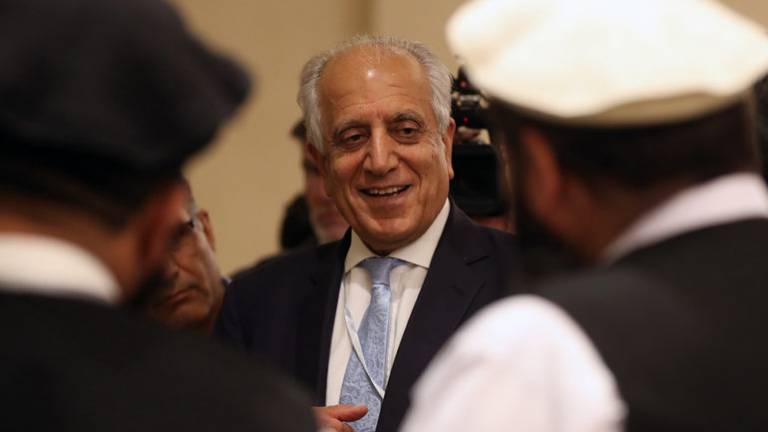A shadow of new assumptions began to cast over the future of Afghan talks as the Democrat candidate Joe Biden won the 2020 US presidential elections. A beacon of hope began to shine in the Afghan presidential palace that was not at ease with Trump’s policy on the Afghan peace process. But the Taliban, understandably, began to feel anxious as the Biden administration announced that the new US administration would review policy on war and peace in Afghanistan.
On February 29, 2020, the Trump administration signed a peace pact with the Taliban in Doha, Qatar. In the peace agreement the Americans agreed to the withdrawal of US forces by May 1, 2021, in return the Taliban upheld commitments to engage in direct talks with the Afghan government and prevent al-Qaeda from mounting attacks on the United States or its allies from Afghan soil.
In early February 2021, President Biden, for the first time after taking office, said he would extend the US military presence in Afghanistan beyond the May 01 deadline set in the US-Taliban peace deal signed between his predecessor and the Taliban militants. Since Biden’s election as the US President, officials of his government implied that the Biden Administration would be tougher than its predecessor, Trump Administration. Late in January, US National Security Adviser Jake Sullivan said that the Biden administration was taking a “hard look” at how the Taliban have honored the February peace deal.
On March 01, the US Special Representative for Afghanistan Reconciliation Zalmay Khalilzad landed in Kabul to discuss the next steps in the intra-Afghan peace talks. For the first time under the Biden Administration, Mr. Khalilzad held meetings with the high-profile Afghan political leaders and discussed the prospect of the future of the talks with the Taliban. The US envoy met President Ghani and chairperson of Afghanistan’s High Council for National Reconciliation Abdul Abdullah in separate meetings. Khalilzad conveyed a new message and policy plan signed by the US Secretary of State.
A source who is familiar with the subject told Kabul Now that in his trip to Kabul Mr. Khalilzad conveyed a “letter” to President Ghani and Abdullah. The letter, as the source says, which is signed by the US Secretary of State asks the Afghan leaders to accelerate peace efforts and coven a national consensus on peace talks with the Taliban. The source tells that if things go as planned, a high-level Afghan delegation is expected to attend a peace conference that would be hosted by Turkey. The US State Department announced that the US peace envoy would resume negotiations on the way ahead with the Islamic Republic and Afghan leaders, Taliban representatives, and regional countries whose interests are best served by the achievement of a just and durable political settlement and permanent and comprehensive ceasefire.
The Afghan government is now busy selecting members of a high-level peace delegation that is expected to hold a new series of talks with the Taliban representatives in Ankara, the capital of Turkey. President Ashraf Ghani, along with his two vices, Amrullah Saleh and Sarwar Danish, Abdullah, Hamid Karzai, the former Afghan president, Mohammad Mohaqiq, Mohammad Karim Khalili, the two Hazara leaders, Marshal Abdul Rashid Dostum, the Uzbek leader, Abdul Rab Rasul Sayyaf, a jihadi leader, and Yonus Qanooni, a Tajik leader, are listed to lead the high-level peace delegation in talks with the Taliban. Gulbuddin Hekmatyar, the leader of Hizb-e-Islami, Ata Mohammad Noor, Salahuddin Rabbani, and Esmail Khan, the three Tajik leaders, are likely expected to join the high-level Afghan delegation, according to the source.
Transitional government
In the new US peace plan for Afghanistan, the Biden Administration tries to push the two parties to establish a new transitional government, something the Afghan government, under President Ghani, has categorically rejected so far. The US will use leverage to compel the Taliban to agree to a ceasefire and in return, the Afghan government will power with the Taliban under the umbrella of a new transitional government. Power will be handed over to a new transitional government if the new series of talks work. The source tells that the US tried to arrange a power transition settlement in the presence of NATO forces in Afghanistan so as the US and its international partners would be able to monitor a peaceful power transition and handle likely political tensions and power squabbles that jeopardize the country.
UN will watch Afghan peace talks in Ankara
The US intents to engage the UN to play a mediating role in new series of Afghan talks that would be hosted by Ankara, says a source who is familiar with the subject. The long series of Afghan peace talks in Doha were held in the absence of monitoring body from the US and other international institutions. In the full absence of an international monitoring body, the Taliban representatives and the Afghan peace delegation easily walked away from the table of the talks in Doha.
The Doha-hosted Afghan peace talks appear to have stalled.
In his trip to Doha, the US peace envoy tries to convince the Taliban representatives to support the new US Afghanistan policy. But getting the Taliban to agree to would be a tough job. For nearly 20 years, the Taliban have been fighting to expel the American forces from Afghanistan and restore their rule. The Trump administration gave significant concessions to the group, and now the militant group demand removing the Taliban from UN sanctions lists. A source tells Kabul Now that Mr. Khalilzad will likely face a difficult time to persuade the Taliban leaders to put an end to violence and agree to a power-sharing deal with the Afghan political leaders.
The Afghan talks will work to end Afghan conflict if Mr. Khalilzad wins the heart and mind of Taliban representatives in Doha.




